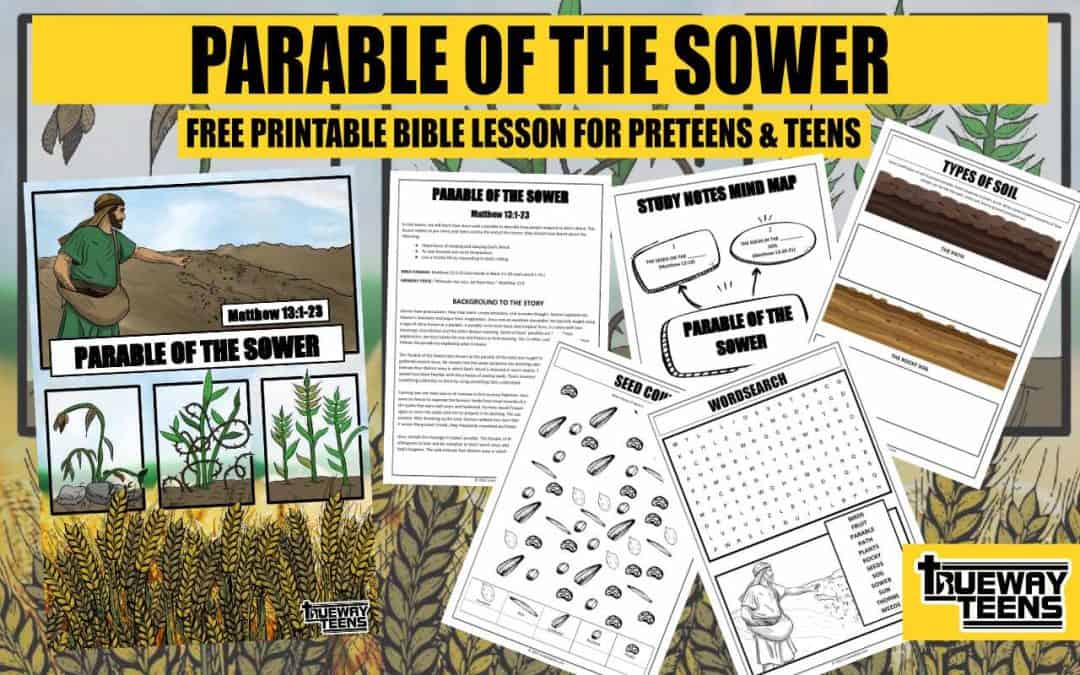In this lesson, we will learn how Jesus used a parable to describe how people respond to God’s Word. This lesson relates to pre-teens and teens and by the end of this lesson, they should have learnt about the following:
- Importance of keeping and obeying God’s Word.
- To stay focused and resist temptations.
- Live a fruitful life by responding to God’s calling.
BIBLE PASSAGE: Matthew 13:1-23 (also found in Mark 4:1-20 and Luke 8:1-15.)
MEMORY VERSE: “Whoever has ears, let them hear.” Matthew 13:9
DOWNLOAD THE FREE PRINTABLE LESSON

Watch the study
BIBLE STUDY NOTES FOR TEENS
Stories have great power; they may teach, create emotions, and provoke thought. Stories captivate the listener’s attention and pique their imagination. Jesus was an excellent storyteller. He typically taught using a type of story known as a parable. A parable, in its most basic and simplest form, is a story with two meanings, one obvious and the other deeper meaning. Some of Jesus’ parables are left without explanation, we must study the text and history to find meaning. Yet, in other, such as this parable Jesus follows the parable by explaining what it means.
The Parable of the Sower (also known as the parable of the soils) was taught to the multitude that had gathered around Jesus. He reveals that the seeds symbolize His teachings about God’s kingdom. The soils indicate four distinct ways in which God’s Word is received in men’s hearts. Most people who heard Jesus would have been familiar with the process of sowing seeds. That’s intentional. Jesus is explaining something unfamiliar to them by using something they understand.
Farming was the main source of revenue in first-century Palestine. Consider the following scenario: There were no fences to separate the farmers’ fields from small mounds of stones. The fields were accessible by dirt paths that were well-worn and hardened. Farmers would frequently plough the soil once and then again to cover the seeds with dirt to prepare it for planting. The use of oxen to pull plough aided the process. After breaking up the land, farmers walked over their fields, shoulder sacks full of seed, scattering it across the ground. Finally, they frequently smoothed and flattened the dirt using a stick.
Jesus reveals the message in today’s parable. The Parable of the Sower emphasizes the listener’s willingness to hear and be receptive to God’s word. Jesus adds that the seeds represent his teachings on God’s kingdom. The soils indicate four distinct ways in which God’s Word is received in men’s hearts.
A MESSAGE FOR BELIEVERS AND UNBELIEVERS
As believers, we are to be sowing God’s word into others and into our lives. Whenever, we open our Bible we should stop and reflect. We should take time to prepare our hearts to be fertile soil to receive from God.
This parable warns us that hardness, shallowness, worldly desires, and the cares of the world not only relate to hearing the gospel message unto salvation but unto sanctification also.
KEY POINTS FROM THE PASSAGE
1. THE SEEDS ON THE PATH (Matthew 13:19)
We hear sermons, listen to podcasts, and read devotionals and books, but are we truly actually listening? It can be like music in the background. We hear it, we recognize the tune, but we don’t have any idea what it is all about. Many people are hearing, but who is listening? That was Jesus’ message.
The seed, which is God’s word, falls on the path, as Jesus describes it, and the birds of the air come and devour the seed straight away. It’s as if someone sits under gospel preaching, and it doesn’t enter their heart at all. They are those who are hard-hearted. The words just run off like water on a rock. The Word is just hitting their eardrums and bouncing off. They don’t even hear it. It never penetrates, and they walk away entirely unmoved by the gospel’s message.
2. THE SEEDS IN THE ROCKY SOIL (Matthew 13:20-21)
Another type of human response is the shallow hearted. The seed that falls on the rocky ground represents the person who hears and is initially enthusiastic but doesn’t allow the seed deep into their lives. According to Jesus, the seed falls and thrives on rocky soil, and it is someone who says, “Yes, I believe this message. I want to live my life in line with the gospel.”
But the change is just on the surface, it doesn’t take root.
This is outward in thinking, rather than inside our thinking. Shallow soils make the external look good and healthy, but the inside remains unchanged.
Jesus’s message of salvation, grace, forgiveness, and is a complete and genuine transformation from the inside out. Trying to change the outward appearance of our lives without allow God to transform the deep parts of our hearts will always lead to frustration and temporary change at best.
3. THE SEEDS AMONG THORNS (Matthew 13:22)
It isn’t just good seeds that take root in fertile soil; thorns will also take advantage of the richness. The thorns will gradually choke off the good seeds if this occurs. The young seeds simply cannot withstand the pressure.
There are many who profess to believe in Jesus as Lord, but become distracted by money, power, or the pursuit of earthly pleasures, and before long, the message that developed from the Word’s seed shrivels and dies.
Likewise, God can speak to us through our Bible reading to forgive someone, serve in a ministry and so on, but as life’s pressures build, we forget and abandon that command.
This is why we must guard our hearts and focus our eyes to Jesus. Remember what 1 Peter 5:8 says, “Be alert and of sober mind. Your enemy, the devil, prowls around like a roaring lion looking for someone to devour.” Hence, let’s have a daily habit of spending time with God in prayer and the Word and removing unhealthy habits and actions from our life.
4. THE SEEDS ON GOOD SOIL (Matthew 13:23)
The last type of soil that Jesus mentioned is deep, fruitful soil. The message falls in that soil establishes a solid root system and being nourished by the soil. The plant sprouts and begins to bear fruit. Jesus says that this is the kind of life we should lead. We ought to take God’s word and allow it to put roots into hearts and nourish it so that our lives bear good fruit.
As we care for a seed’s growth, discipleship is a way of taking care of our spiritual growth. (Prayer, confession of sins, reading Scripture and trust in God).
It’s not easy to follow Christ. The battle is physical, mental, and spiritual in nature. But we must remember and hold onto God’s word. 1 Peter 1:23 reminds us, “For you have been born again, not of perishable seed, but of imperishable, through the living and enduring word of God.”
5. CONCLUSION
In conclusion, review the following points considered in the lesson with the pre-teens and then pray with them to round up the lesson:
- Every day, we should prepare our hearts to receive God’s word.
- The world and Satan will try to steal and hinder our spiritual growth.
- We are to live a fruitful life as we continue to respond to what God has called us to do.
YOUTH GAMES AND ACTIVITIES FOR THE PARABLE OF THE SOWER
HUNGRY BIRDS
- Select one player to be a scarecrow. All other players will be birds.
- Place some bits of paper on the floor to represent seeds.
- All the birds line up on one side of the room. They should try to make it the other side and collect a seed on the way.
- The scarecrow should try to tag the birds. Any birds tagged are scared away and out of the game.
- The bird with the most seeds at the end of the game wins.
PLANT IN GOOD SEED
- Create 4 large squares on the floor using tape or rope.
- Each square represents a type of soil from the parable.
- From behind a line, each player has the chance to throw 3 beanbags or paper balls into the field.
- The player scores a point for landing in good soil.
- Make each round more difficult by moving the line further away or making the squares smaller.
SEED PLANTING
- There is no better way to learn about seeds and planting than by planting seeds.
- Let the children plant some seeds in compost to take home. Use flower or vegetable seeds.
Free printable Teen Worksheets in the lesson pack.
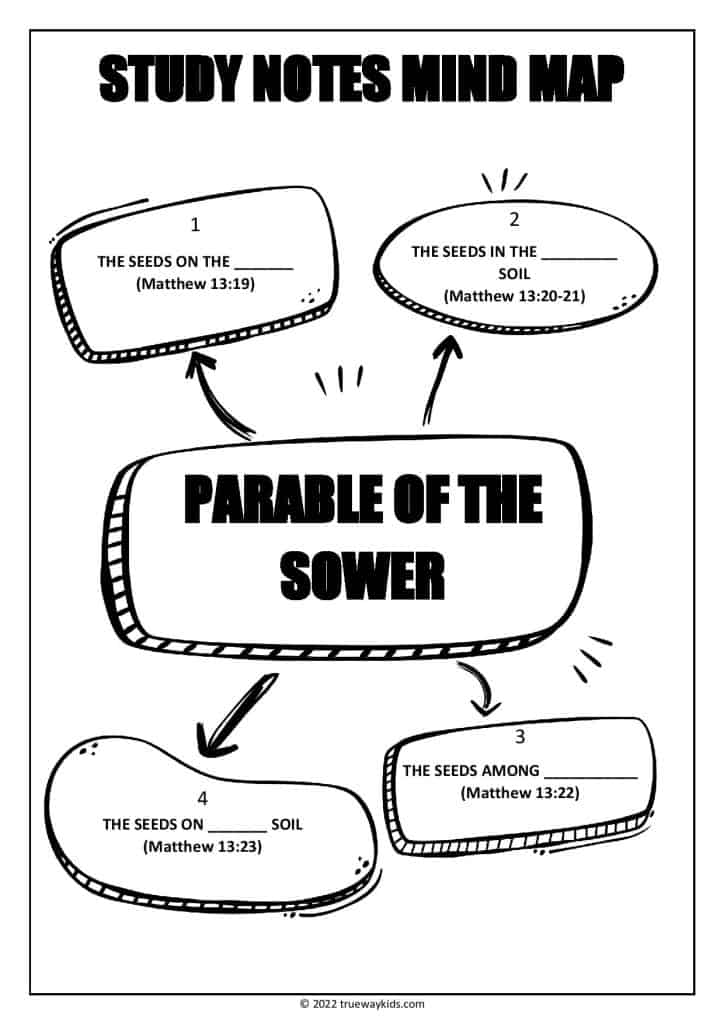
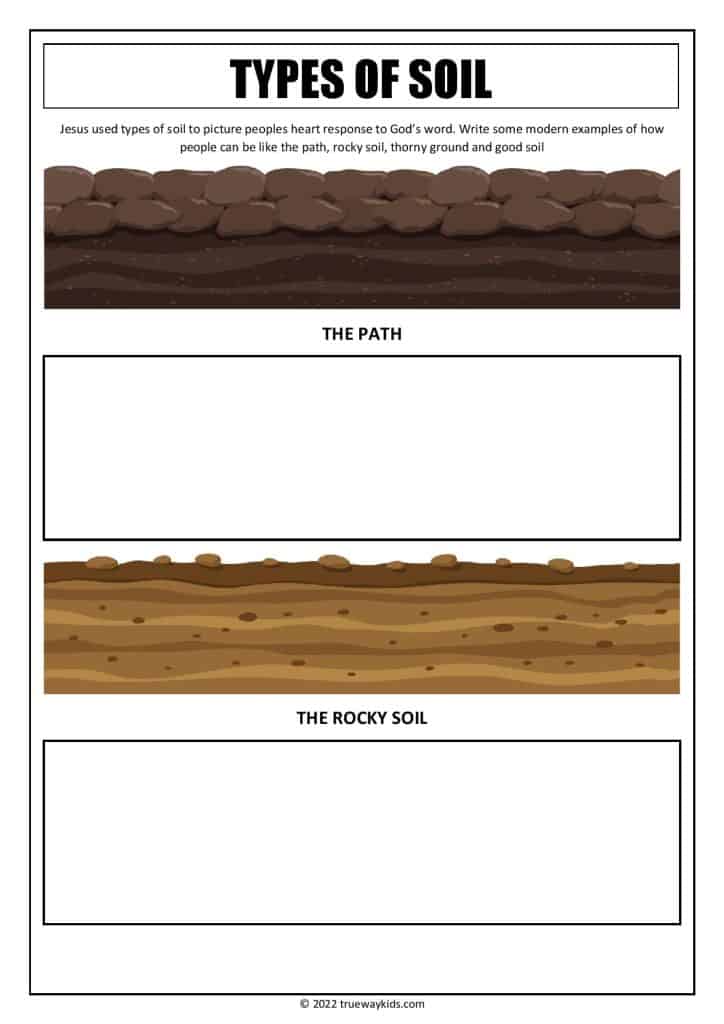
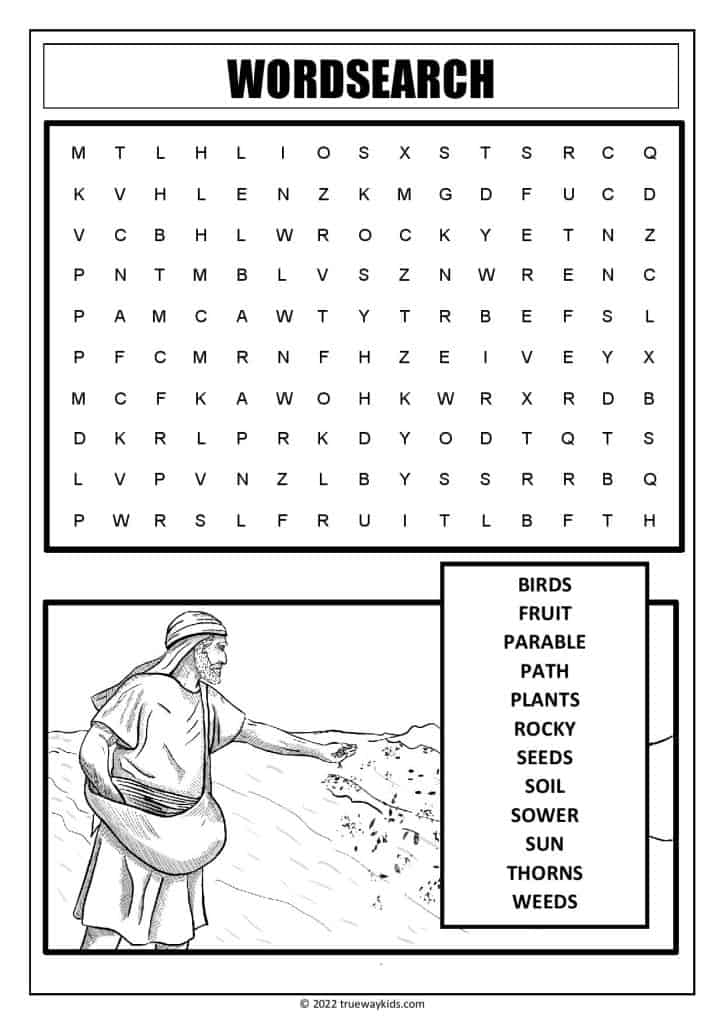
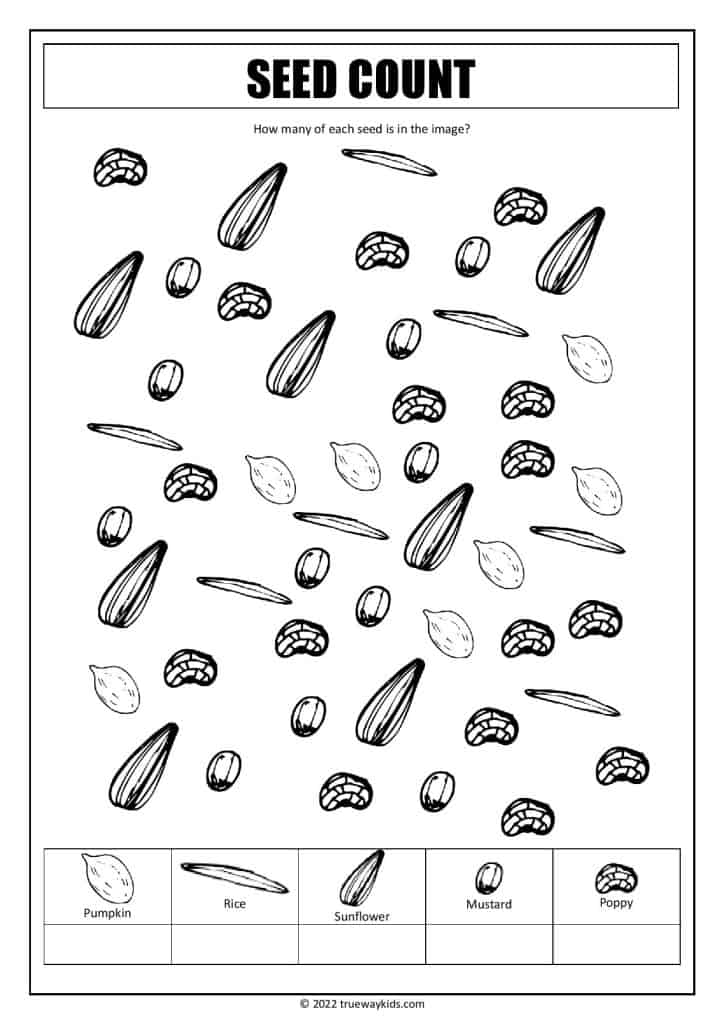
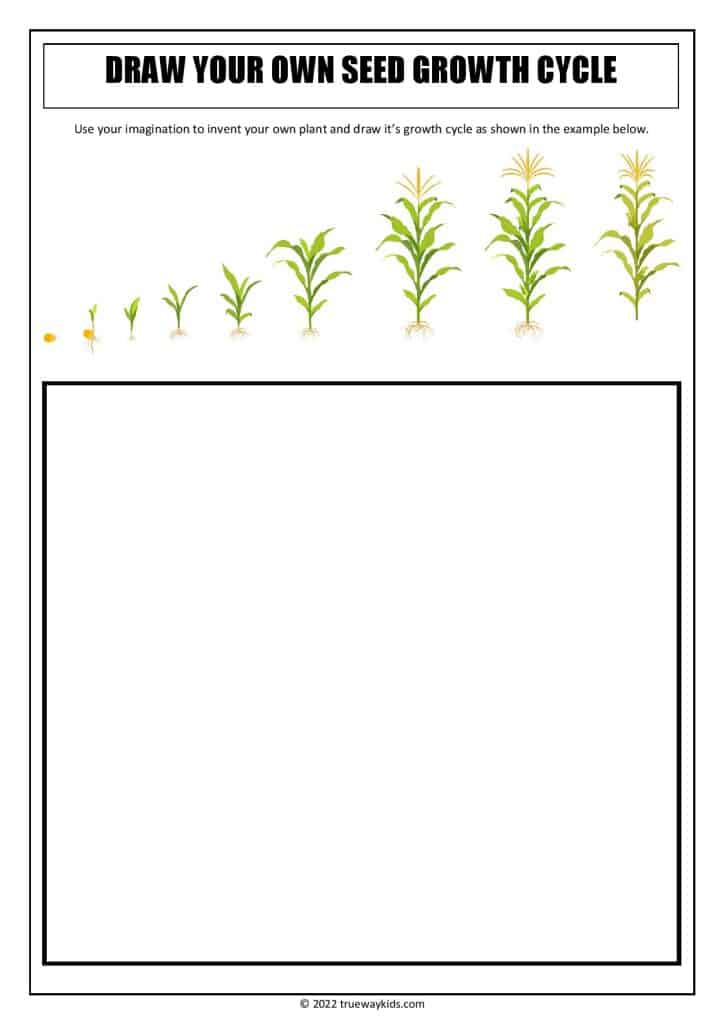
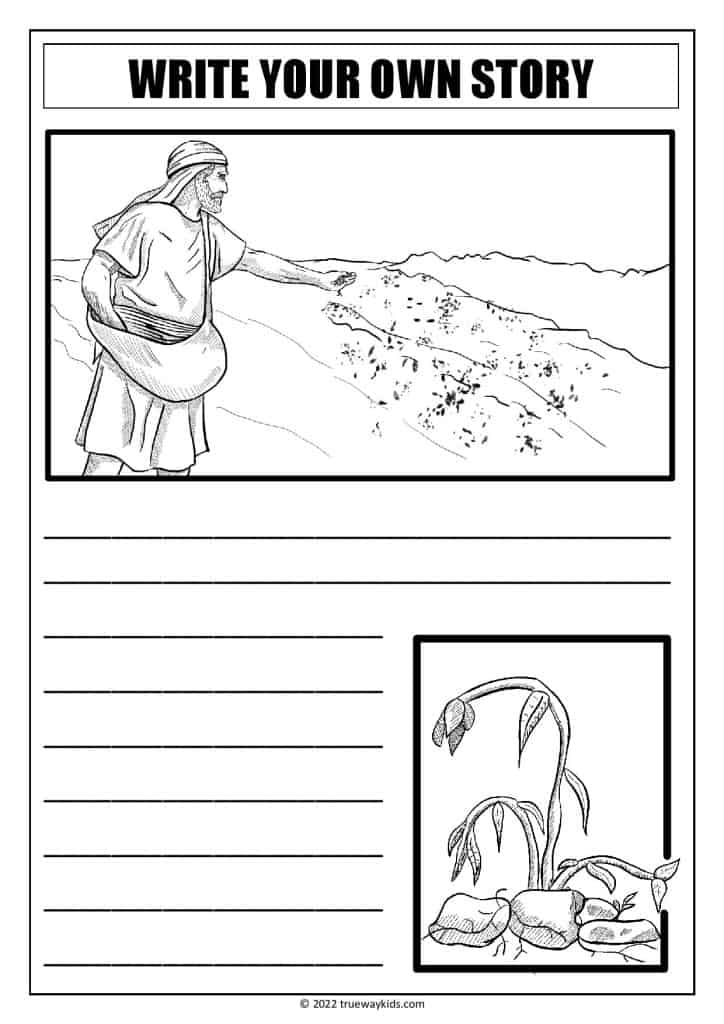
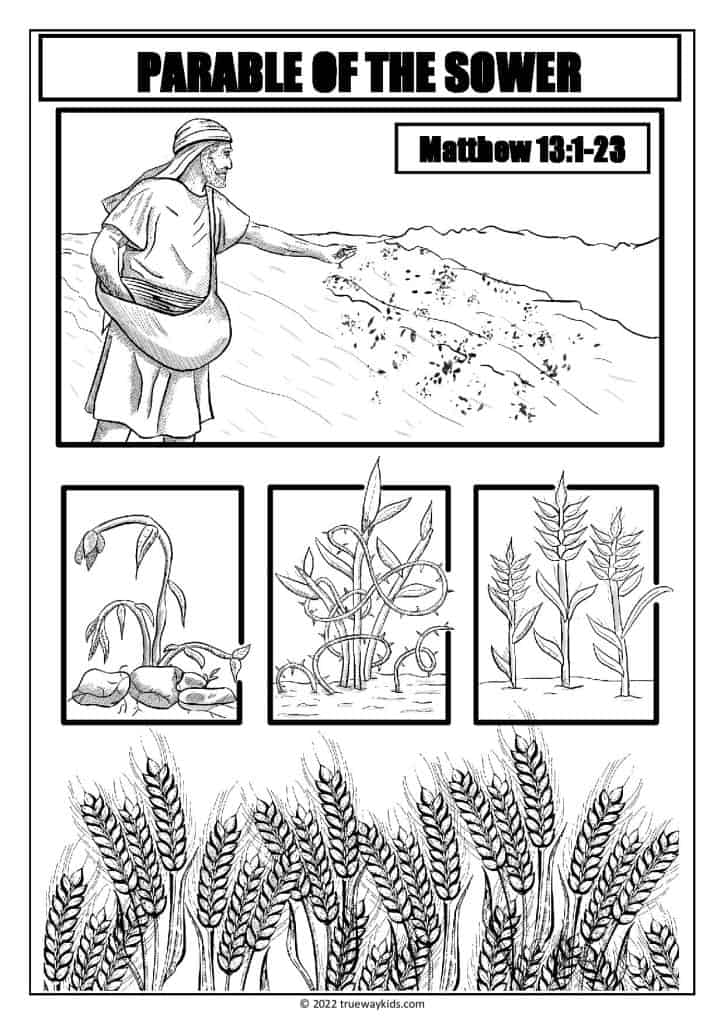

DOWNLOAD THE FREE PRINTABLE LESSON


